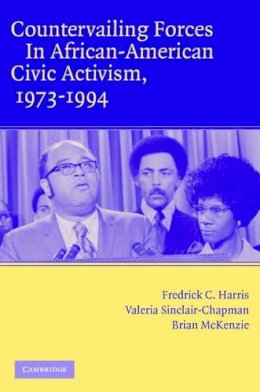
Stock image for illustration purposes only - book cover, edition or condition may vary.
Countervailing Forces in African-American Civic Activism, 1973–1994
Fredrick C. Harris
€ 39.20
FREE Delivery in Ireland
Description for Countervailing Forces in African-American Civic Activism, 1973–1994
Paperback. This is a study assessing black civic participation after the civil rights movement. Num Pages: 190 pages, 5 tables. BIC Classification: GTB; JPVH. Category: (P) Professional & Vocational. Dimension: 228 x 152 x 11. Weight in Grams: 264.
In this study assessing black civic participation after the civil rights movement, Fredrick C. Harris, Valeria Sinclair-Chapman and Brian D. McKenzie demonstrate that the changes in black activism since the civil rights movement is characterized by a tug-of-war between black political power on one side and economic conditions in black communities on the other. As blacks gain greater access and influence within the political system, black participation in political activities increases while downward turns in the economic conditions of black communities produce less civic involvement in black communities. Examining changes in black activism from the early 1970s to the 1990s, ... Read more
In this study assessing black civic participation after the civil rights movement, Fredrick C. Harris, Valeria Sinclair-Chapman and Brian D. McKenzie demonstrate that the changes in black activism since the civil rights movement is characterized by a tug-of-war between black political power on one side and economic conditions in black communities on the other. As blacks gain greater access and influence within the political system, black participation in political activities increases while downward turns in the economic conditions of black communities produce less civic involvement in black communities. Examining changes in black activism from the early 1970s to the 1990s, ... Read more
Product Details
Format
Paperback
Publication date
2005
Publisher
Cambridge University Press United Kingdom
Number of pages
190
Condition
New
Number of Pages
190
Place of Publication
Cambridge, United Kingdom
ISBN
9780521614139
SKU
V9780521614139
Shipping Time
Usually ships in 15 to 20 working days
Ref
99-2
About Fredrick C. Harris
Fredrick C. Harris is Associate Professor and Director of the Center for the Study of African-American Politics at the University of Rochester. Previously he was a visiting scholar at the Russell Sage Foundation and was named a Fellow at the Woodrow Wilson International Center for Scholars. Harris is the author of Something Within: Religion in African-American Political Activism (Oxford ... Read more
Reviews for Countervailing Forces in African-American Civic Activism, 1973–1994
"It was the best of times, it was the worst of times....'Countervailing Forces is organized around the insights of this cliché, but moves well beyond it. The book focuses our attention on countervailing society-wide forces that together shape civic engagement, and shows how these forces affect politic dynamics over time. It thereby illuminates the ways in which formal and informal ... Read more
